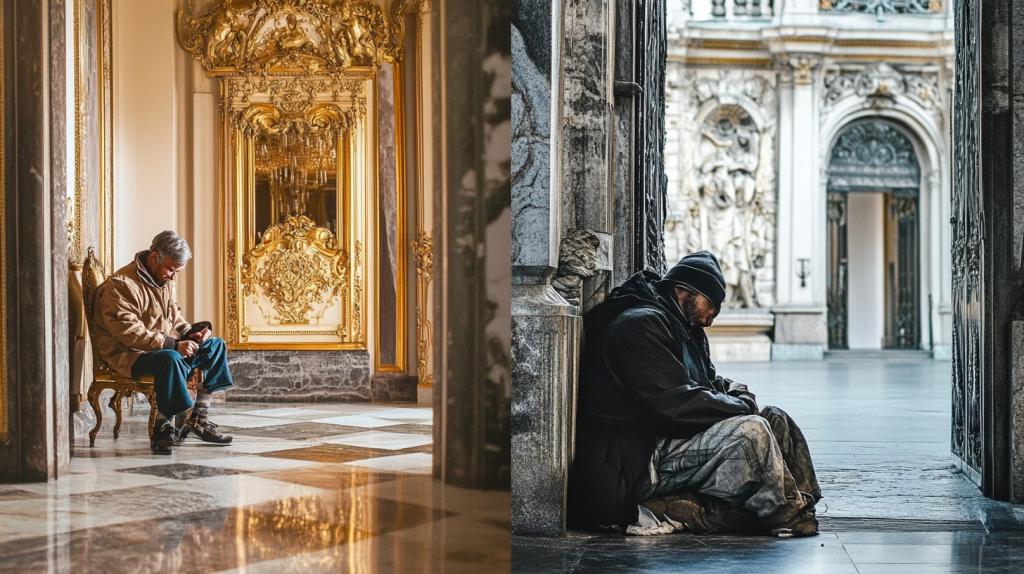Do you think that Jesus would take money from the poor? I don’t.

Should Cuts in Social Services Really Fund Tax Cuts for the Rich?
Last week, the U.S. House of Representatives passed a budget bill that cut spending. The House would cut $1.1 trillion in Medicaid and the Supplemental Nutrition Assistance Program (SNAP.) The “savings” would fund $1.1 trillion in tax cuts for the richest 1% of us. In effect, this is a $1.1 trillion transfer from 99% of us to the richest 1% of us.
Almost two-thirds of SNAP recipients are families with children. Approximately one in five children receive SNAP assistance, and over one in three children receive health care from Medicaid. But, the budget did NOT include “no taxes on tips,” “no taxes on overtime” or “no taxes on Social Security.” Many people voted for these changes, which could benefit the other 99%.
Are food and health care for poor children more essential than tax cuts for the richest 1% of us? Does anyone die without food or health care? Do rich people die without tax cuts?
If we cut spending, should the “savings” be used to cut taxes for the other 99% or us or to cut the deficit that we leave our children? Instead, the other 99% of us are financing tax cuts for the 1%. Do you think that Jesus would take money from the poor and give it to the rich? (I don’t.) Do you think that it is ironic to take money from the poor and to pray about it? (I do.)
My conservative friends tell me that they like what is happening, but they do NOT like how it is happening. That tells me at least two big things. First, they do NOT realize what is happening. Second, they do NOT realize that doing things the right way is just as important as doing the right things. Sometimes, it is even MORE important to do things the right way.
For 25 years, I worked at one of the most aggressive companies in investment banking, which is one of the most competitive industries in the world, and I know that capitalism generates wealth. Also, I know that capitalism creates winners and losers. The challenge to any civilized society is to ensure that the “losers” do not get ground in the gears.
It is one thing to embrace free markets. It is another thing to support fiscal policies and tax reforms that take over $1 trillion from 99% of us to give it to richest 1% of us.
Is Government Really More Expensive?
Most people assume that the private sector is more efficient than the public sector. But, I spent 25 years assisting state and local governments with their borrowing and financial management. Most people forget that the private sector has to pay taxes (add 20%) and produce profit (add 15%.) So, in head-to-head competition, the private sector is often MORE costly than the public sector.
When I worked for the City of Phoenix, they required the City departments to bid for City contracts against the private sector. Sometimes, the department won, and sometimes the company won. Either way, both parties sharpened their pencils before the next bid. This is a much more nuanced, practical and successful way to cut costs than ill-advised and unprincipled budget cuts.
Also, governments borrow money at a lower cost than most private companies. Governments are creatures of the State that exist in perpetuity and they are more creditworthy than companies. So, for capital-intensive services, such as hospitals, schools, prisons, toll roads and utilities, the private sector is often considerably MORE costly than the public sector.
If you have questions, ask me about the problems with charter schools, private prisons, private toll road concessions, and privatized public utilities. In Texas, people have died in private prisons, private toll roads have defaulted, and privatized utilities reverted to their public operators after the private operators broke promises, deferred maintenance and encountered financial problems.
Does Government Really Have a Spending Problem?
Some say that the U.S. has a taxing problem, NOT a spending problem. The Tax Policy Center reports that taxes at all levels of government represented 27% of gross domestic product (GDP), compared with a weighted average of 34% for the other 37 OECD member countries. Many of these countries have higher standards of living than we have in the United States.
Likewise, the Center for American Progress (CAP) reports that without the previous Bush and Trump tax cuts, debt as a percentage of the economy would be declining permanently.
Could our taxes actually be too LOW? When I worked, I was among the top 1%, so I do NOT have a problem with rich people. (I have a problem with rich people taking money from poor people.) Some of my conservative, middle-class friends think that taxation is theft. In the last 50 years, I paid over $2 million in income taxes, but I knew that taxes were a cost of doing business.
My taxes paid for the courts and hospitals and roads and schools that helped me to succeed. You can see what society looks like without public services and safety nets in any third-world country. If we continue to cut our public services and decimate our safety nets, you will be able to see that in this country, too.
Do You Think that Jesus Would Take Money from the Poor?
You can also see the effects of severe income inequality in third-world countries, where the rich live behind barbed wire fences. And, you can see the effects when revolutions topple governments. At some point (and we might be getting close to it) the rich will have to reduce income inequality because it will be in their best interests to do so. After all, somebody has to buy their stuff.
Do you think that Jesus would take money from the poor? I don’t.
If you want to keep up with the latest from You Might Be Right, please subscribe.
The Way received a 2024 Nautilus Book Award.
If you enjoyed this article, please leave a comment at the bottom of this page.
Thanks for reading You Might Be Right!!














